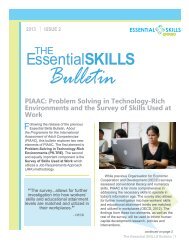Uncharted Territory - Essential Skills Ontario
Uncharted Territory - Essential Skills Ontario
Uncharted Territory - Essential Skills Ontario
You also want an ePaper? Increase the reach of your titles
YUMPU automatically turns print PDFs into web optimized ePapers that Google loves.
NEW MODELS FOR A NEW WORLD4. NEW MODELS FOR A NEW WORLD4.1 Social EntrepreneurshipThe words “entrepreneurship” and “entrepreneurs” refer to the processes andpeople who organize a business venture and assume the risk, but we oftenunderstand entrepreneurs as the individuals who have an innate sense andbusiness acumen to recognize and act on opportunities. Ashoka defines socialentrepreneurs as individuals with innovative solutions to our most pressingsocietal challenges. They do not leave these issues for government to managebut instead find out what is not working and look to solve the problem bychanging the system, testing solutions, sharing the solution and inspiringothers to take new steps (Ashoka, 2013). Combining creativity andperseverance, entrepreneurs create or bring about new ideas, services,products and companies that have the potential to change the world for thebetter (Martin & Osberg, 2007). So what is the difference betweenentrepreneurship and social entrepreneurship?Martin and Osberg suggest that the “value proposition” distinguishesentrepreneurship from social entrepreneurship (2007). For mostentrepreneurs the value proposition is that in creating a new enterprise theycan generate profits through the goods or services they create and deliver.While there may be some benefits to society, the impetus is mainly profit.Social entrepreneurship, on the other hand, recognizes a social problem anduses entrepreneurial principles to create and manage an enterprise primarilyto achieve a desired social good. A social entrepreneur does not act primarilyfor financial gain but rather, to create value in the form of transformationalbenefits that have positive impact on the lives of those in need.[see Michael Fergusson p.15]In terms of the value proposition, traditional entrepreneurship assumes thatindividuals in the marketplace can afford and will often pay a premium for agiven product or service, allowing a profit for the entrepreneur. A socialentrepreneur, however, does the opposite. Social entrepreneurs provide anddesign goods and services for disadvantaged populations that lack the meansor resources to achieve these benefits on their own (Martin & Osberg, 2007).These enterprises or initiatives do not preclude income generation, but profitsare not the overarching goal. They may be structured as either not-for-profitsor for-profits.14 • <strong>Uncharted</strong> <strong>Territory</strong>: Can Social Innovation Revitalize Literacy and <strong>Essential</strong> <strong>Skills</strong> Programs?




